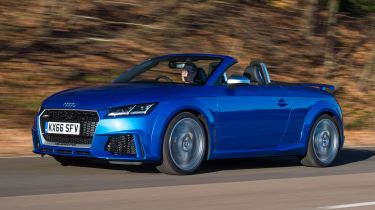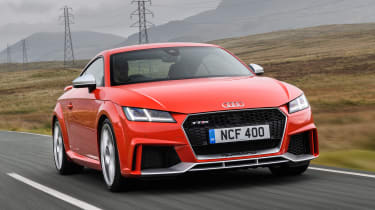Audi TT RS review - MPG, CO2 and Running Costs
Running a TT RS will cost a packet, but if you can’t afford the fuel bills there’s a much cheaper diesel version

If you want a TT that’s cheap to run, you should be reading our road test of the frugal diesel models. If you’re so minded, you can get one that’ll return up to 63mpg and emit just 116g/km. Alternatively, keep reading, and steel yourself for company car tax rates and VED charges based on a £50,000+ purchase price and 187g/km C02 emissions.
That latter figure isn’t appalling by any means when you consider the performance the TT RS offers, but it’s still going to expose you to some hefty annual charges. You’ll be right at the top of the £800 first year VED band (it’s £450 thereafter), and the Benefit In Kind rate for 2017/18 is 36 percent of the list price. As a higher rate taxpayer that means you’ll be in for nearly £7,500 a year – a BMW M2 Coupe attracts a lesser £6,800 charge, while a PDK-equipped Porsche 718 Cayman S is £6,500.
The TT RS isn’t too bad on fuel economy if you drive it sensibly, with up to 34mpg achievable on the combined cycle in official figures. The car has a 50-litre fuel tank which gives you a theoretical range of 374 miles, but not if you want to get there quickly, of course.
As with all performance cars, watch out for the consumable costs of heavily used/abused brake pads and tyres. Especially if you indulge in the occasional track day.
Insurance groups
Insurance costs for the Audi TT RS will be significant, as you’d expect. The TT RS Coupe falls into group 43, while the TT RS Roadster insurance is group 46.
Depreciation
The TT RS Roadster is the most expensive version of Audi’s sports car, costing upwards of £50,000. Drive it for three years and 30,000 miles and we reckon you should be able to sell it for a little more than £20k.







